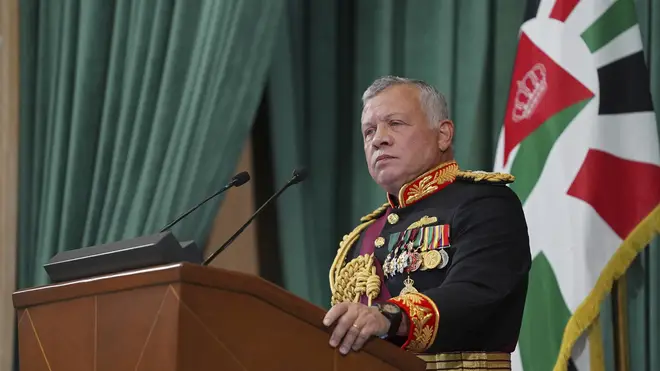
Iain Dale 7pm - 10pm
7 April 2021, 19:34

King Abdullah II said those who were party to the sedition were ‘from our own home and outside it’.
Jordan’s king has addressed the public feud with his half-brother, Prince Hamzah, portraying it as an attempted “sedition” that caused him shock, anger and pain.
Wednesday’s statement, carried by Jordan TV, marked the first time King Abdullah II addressed the unprecedented rift in the royal family which erupted over the weekend.
“I speak to you today as my family and tribesmen … to reassure you that the sedition has been buried,” the statement said.

“The challenge of the last few days was not the hardest or the most dangerous to the stability of our nation, but it was the most painful because those who are party to the sedition were from our own home and from outside it,” he said.
“Nothing can come close to the shock and the pain and anger I felt, as a brother, and head of the Hashemite family and as a leader to this dear people.”
He said Prince Hamzah, who has not been seen or heard from in days, was “with his family at his palace, under my care”.
There is no sign that authorities have released up to 18 other detainees, including members of one of the powerful tribes on which the monarchy has historically relied.
Authorities have meanwhile imposed a sweeping gag order on any coverage of the royal dispute in a sign of how sensitive they are to how it is being perceived.
Jordan was already grappling with an economic crisis exacerbated by the coronavirus pandemic, with one in four people out of work. Long-standing complaints about corruption and misrule have fuelled scattered protests in recent months.

The region’s strategic landscape is shifting as powerful Gulf states pursue closer ties with Israel, potentially undermining Jordan’s role in the Middle East peace process.
“The dispute with Prince Hamzah shows that the kingdom can no longer use its international standing as a mediator in regional conflicts and bulwark of security for the West without addressing growing economic and political challenges at home,” said Tuqa Nusairat, an expert at the Atlantic Council.
“Jordanians have been consistently expressing concerns over the direction of the country, including publicly protesting,” she added.
The crisis in the royal family erupted on Saturday when Jordan’s military chief of staff visited Prince Hamzah and warned him to stop attending meetings with critics of the government.
Things quickly escalated, with Hamzah accusing the security establishment of threatening him and ordering the general to leave his home.
Authorities placed the former crown prince under a form of house arrest and detained 18 people, including former senior officials.
On Sunday, the government said Hamzah and others were involved in a “malicious plot” against the kingdom’s security with foreign support.
Abdullah and Hamzah are both sons of King Hussein, who ruled Jordan for nearly half a century before his death in 1999. Abdullah had appointed Hamzah as crown prince upon his succession but stripped him of the title in 2004.